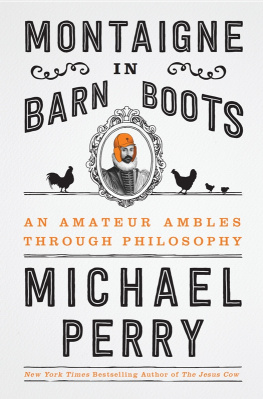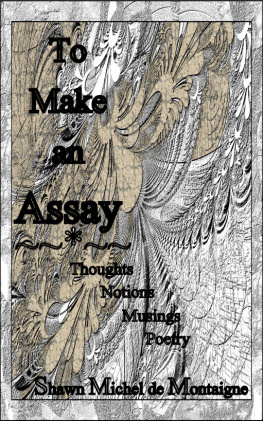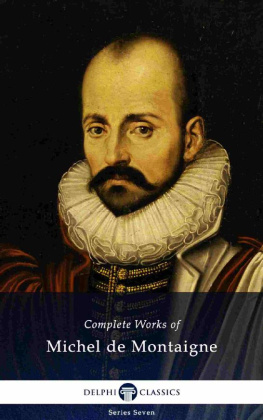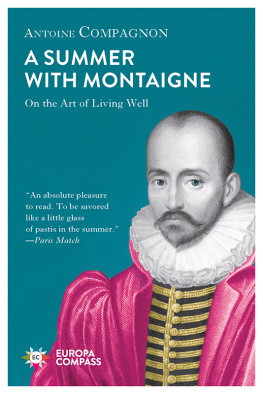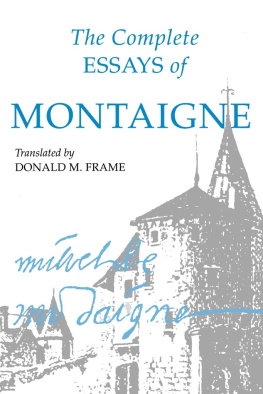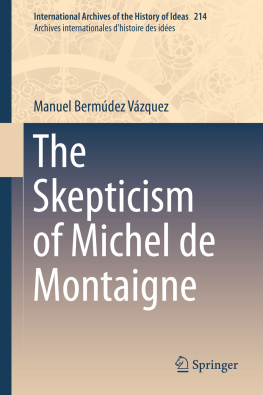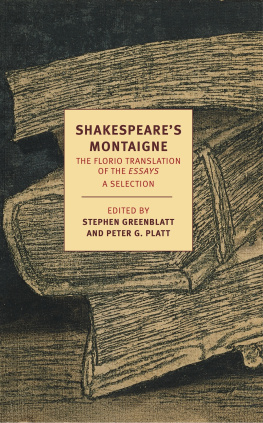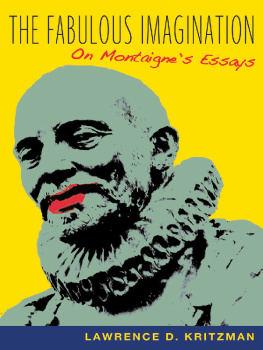Montaigne Michel de - Essays
Here you can read online Montaigne Michel de - Essays full text of the book (entire story) in english for free. Download pdf and epub, get meaning, cover and reviews about this ebook. genre: Science. Description of the work, (preface) as well as reviews are available. Best literature library LitArk.com created for fans of good reading and offers a wide selection of genres:
Romance novel
Science fiction
Adventure
Detective
Science
History
Home and family
Prose
Art
Politics
Computer
Non-fiction
Religion
Business
Children
Humor
Choose a favorite category and find really read worthwhile books. Enjoy immersion in the world of imagination, feel the emotions of the characters or learn something new for yourself, make an fascinating discovery.
- Book:Essays
- Author:
- Genre:
- Rating:5 / 5
- Favourites:Add to favourites
- Your mark:
- 100
- 1
- 2
- 3
- 4
- 5
Essays: summary, description and annotation
We offer to read an annotation, description, summary or preface (depends on what the author of the book "Essays" wrote himself). If you haven't found the necessary information about the book — write in the comments, we will try to find it.
Essays — read online for free the complete book (whole text) full work
Below is the text of the book, divided by pages. System saving the place of the last page read, allows you to conveniently read the book "Essays" online for free, without having to search again every time where you left off. Put a bookmark, and you can go to the page where you finished reading at any time.
Font size:
Interval:
Bookmark:
The Project Gutenberg EBook of Literary and Philosophical Essays, by Various
Copyright laws are changing all over the world. Be sure to check thecopyright laws for your country before downloading or redistributingthis or any other Project Gutenberg eBook.
This header should be the first thing seen when viewing this ProjectGutenberg file. Please do not remove it. Do not change or edit theheader without written permission.
Please read the "legal small print," and other information about theeBook and Project Gutenberg at the bottom of this file. Included isimportant information about your specific rights and restrictions inhow the file may be used. You can also find out about how to make adonation to Project Gutenberg, and how to get involved.
**Welcome To The World of Free Plain Vanilla Electronic Texts**
**eBooks Readable By Both Humans and By Computers, Since 1971**
*****These eBooks Were Prepared By Thousands of Volunteers!*****
Title: Literary and Philosophical Essays
Author: Various
Release Date: May, 2004 [EBook #5637][Yes, we are more than one year ahead of schedule][This file was first posted on August 1, 2002]
Edition: 10
Language: English
*** START OF THE PROJECT GUTENBERG EBOOK, LITERARY AND PHILOSOPHICAL ESSAYS ***
David Turner, Charles Franks and the Online Distributed Proofreading Team.
THAT WE SHOULD NOT JUDGE OF OUR HAPPINESS UNTIL AFTER OUR DEATH THAT
TO PHILOSOPHISE IS TO LEARNE How TO DIE OF THE INSTITUTION AND
EDUCATION OF CHILDREN OF FRIENDSHIP OF BOOKES BY MONTAIGNE
Michel Eyquem De Montaigne, the founder of the modern Essay, wasborn February 28, 1533, at the chateau of Montaigne in Pirigord. Hecame of a family of wealthy merchants of Bordeaux, and was educatedat the College de Guyenne, where he had among his teachers the greatScottish Latinist, George Buchanan. Later he studied law, and heldvarious public offices; but at the age of thirty-eight he retired tohis estates, where he lived apart from the civil wars of the time,and devoted himself to study and thought. While he was traveling inGermany and Italy, in 1580-81, he was elected mayor of Bordeaux, andthis office he filled for four years. He married in 1565, and hadsix daughters, only one of whom grew up. The first two books of his"Essays" appeared in 1580; the third in 1588; and four years laterhe died.
These are the main external facts of Montaigne's life: of the manhimself the portrait is to be found in his book. "It is myself Iportray," he declares; and there is nowhere in literature a volumeof self-revelation surpassing his in charm and candor. He is franklyegotistical, yet modest and unpretentious; profoundly wise, yetconstantly protesting his ignorance; learned, yet careless,forgetful, and inconsistent. His themes are as wide and varied ashis observation of human life, and he has written the finest eulogyof friendship the world has known. Bacon, who knew his book andborrowed from it, wrote on the same subject; and the contrast of theessays is the true reflection of the contrast between thepersonalities of their authors.
Shortly after Montaigne's death the "Essays" were translated intoEnglish by John Florio, with less than exact accuracy, but in astyle so full of the flavor of the age that we still read Montaignein the version which Shakespeare knew. The group of examples hereprinted exhibits the author in a variety of moods, easy, serious,and, in the essay on "Friendship," as nearly impassioned as hisphilosophy ever allowed him to become.
Reader, be here a well-meaning Booke. It doth at the firth entranceforewarne thee, that in contriving the same I have proposed unto myselfe no other than a familiar and private end: I have no respect orconsideration at all, either to thy service, or to my glory: myforces are not capable of any such desseigne. I have vowed the sameto the particular commodity of my kinsfolks and friends: to the end,that losing me (which they are likely to doe ere long), they maytherein find some lineaments of my conditions and humours, and bythat meanes reserve more whole, and more lively foster the knowledgeand acquaintance they have had of me. Had my intention beene toforestal and purchase the world's opinion and favour, I would surelyhave adorned myselfe more quaintly, or kept a more grave and solemnemarch. I desire therein to be delineated in mine owne genuine,simple and ordinarie fashion, without contention, art or study; forit is myself e I pourtray. My imperfections shall therein be read tothe life, and my naturall forme discerned, so farre-forth as publikereverence hath permitted me. For if my fortune had beene to havelived among those nations which yet are said to live under the sweetliberty of Nature's first and uncorrupted lawes, I assure thee, Iwould most willingly have pourtrayed my selfe fully and naked. Thus,gentle Reader, myself I am the groundworke of my booke: it is thenno reason thou shouldest employ thy time about so frivolous andvaine a subject.
Therefore farewell.
From MONTAIGNE,
The First of March, 1580.
scilicet ultima semper
Expectanda dies homini est, dicique beatus
Ante obitum nemo, supremaque funera debat.
[Footnote: Ovid. Met. 1, iii. 135.]
We must expect of man the latest day,
Nor ere he die, he's happie, can we say.
The very children are acquainted with the storie of Croesus to thispurpose: who being taken by Cyrus, and by him condemned to die, uponthe point of his execution, cried out aloud: "Oh Solon, Solon!"which words of his, being reported to Cyrus, who inquiring what hemeant by them, told him, hee now at his owne cost verified theadvertisement Solon had before times given him; which was, that noman, what cheerefull and blandishing countenance soever fortuneshewed them, may rightly deeme himselfe happie, till such time as hehave passed the last day of his life, by reason of the uncertaintieand vicissitude of humane things, which by a very light motive, andslight occasion, are often changed from one to another cleanecontrary state and degree. And therefore Agesilaus answered one thatcounted the King of Persia happy, because being very young, he hadgotten the garland of so mightie and great a dominion: "yea but saidhe, Priam at the same age was not unhappy." Of the Kings of Macedonthat succeeded Alexander the Great, some were afterward seene tobecome Joyners and Scriveners at Rome: and of Tyrants of Sicilie,Schoolemasters at Corinth. One that had conquered halfe the world,and been Emperour over so many, Armies, became an humble andmiserable suter to the raskally officers of a king of AEgypte: At sohigh a rate did that great Pompey purchase the irkesome prolongingof his life but for five or six moneths. And in our fathers daies,Lodowicke Sforze, tenth Duke of Millane, under whom the State ofItalic had so long beene turmoiled and shaken, was seene to die awretched prisoner at Loches in France, but not till he had lived andlingered ten yeares in thraldom, which was the worst of hisbargaine. The fairest Queene, wife to the greatest King ofChristendome, was she not lately scene to die by the hands of anexecutioner? Oh unworthie and barbarous cruelties And a thousandsuch examples. For, it seemeth that as the sea-billowes and surgingwaves, rage and storme against the surly pride and stubborne heightof our buildings, so are there above, certaine spirits that enviethe rising prosperities and greatnesse heere below.
Next pageFont size:
Interval:
Bookmark:
Similar books «Essays»
Look at similar books to Essays. We have selected literature similar in name and meaning in the hope of providing readers with more options to find new, interesting, not yet read works.
Discussion, reviews of the book Essays and just readers' own opinions. Leave your comments, write what you think about the work, its meaning or the main characters. Specify what exactly you liked and what you didn't like, and why you think so.



